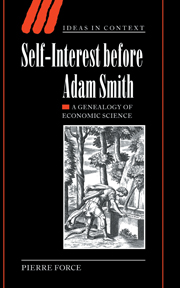Book contents
6 - Self-interest and the public good
Published online by Cambridge University Press: 22 September 2009
Summary
How can maxims so clear, so agreeable to plain common sense, and to facts attested by all who have made commerce their study, have yet been rejected in practice by all the ruling powers of Europe? … To speak the truth, it is because the first principles of political economy are as yet but little known; because ingenious systems and reasonings have been built upon hollow foundations and taken advantage of, on the one hand, by interested rulers, who employ prohibition as a weapon of offense, or an instrument of revenue; and, on the other, by the personal avarice of merchants and manufacturers, who have a private interest in exclusive measures.
Jean-Baptiste Say, A Treatise on Political Economy (1803)For economists today, the relationship between economics and politics is a problematic one. Some see the origin of this uneasy relationship in The Wealth of Nations. According to Smith, the “folly of human laws” stands as an obstacle to the rational pursuit of self-interest, and yet “the natural effort of every individual to better his condition, when suffered to exert itself with freedom and security, is so powerful a principle” that it is capable of “surmounting a hundred impertinent obstructions” caused by ill-conceived laws. Hence the paradox formulated by George J. Stigler: “If self-interest dominates the majority of men in all commercial undertakings, why not also in all their political undertakings? Why should legislators erect “a hundred impertinent obstructions” to the economic behavior which creates the wealth of nations?
- Type
- Chapter
- Information
- Self-Interest before Adam SmithA Genealogy of Economic Science, pp. 205 - 255Publisher: Cambridge University PressPrint publication year: 2003

